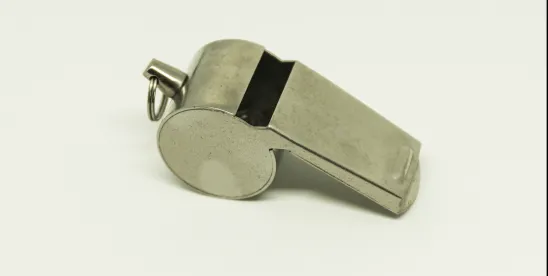Introduction
The Dodd-Frank Wall Street Reform and Consumer Protection Act allows whistleblowers to appeal denials of SEC whistleblower awards. This appeals process ensures that the SEC properly implements the mandatory award provisions of the Dodd-Frank Act and that qualified whistleblowers receive the awards they are entitled to, via review by the federal Courts of Appeals.
However, to date, appellate courts have almost uniformly upheld SEC denials. Many denials arise from errors made by whistleblowers during the application and appeal process, rather than on the merits of the whistleblower’s claims. Issues with the quality and sourcing of whistleblower information have also led to denied appeals.
A review of the case law reveals four recurring issues that have led to unsuccessful appeals of SEC award denials.
Raising New Arguments on Appeal
Appellate courts have consistently held that arguments, issues, or theories on which a whistleblower bases their appeal must have been previously raised to the SEC or in a plaintiff’s opening brief. The appellate courts typically disregard arguments raised for the first time on appeal
The Fifth Circuit established an exception to this rule in Barr v. SEC, No. 23-60216, 2024 U.S. App. LEXIS 22185 (5th Cir. Aug. 30, 2024). The court held that a whistleblower could raise an issue on appeal in a matter where the whistleblower did not have a previous opportunity to challenge the holding before the SEC. Nevertheless, the appeal in Barr was rejected, on the basis that (1) to appeal the exercise of the SEC’s exemptive authority, a whistleblower must demonstrate that the SEC abused its discretion, and (2) a bankruptcy case brought against Barr’s former employer did not constitute a ‘covered or related action’ warranting a whistleblower award under the Dodd-Frank Act.
This issue was also addressed by the D.C. Circuit in Nelson v. SEC, No. 22-1316, 2025 U.S. App. LEXIS 13209 (D.C. Cir. Apr. 25, 2025). Nelson initially raised an argument in his award application but failed to raise it again in his objections to the SEC's preliminary award determination. While the panel agreed that it should reject Nelson's appeal because the SEC had not acted arbitrarily or capriciously, they disagreed on whether Nelson had forfeited this particular argument. A two-judge majority held that Nelson had not raised the argument in his objection and therefore, he forfeited it. Whistleblowers can avoid this issue by stating in an objection that one is incorporating all arguments raised in the initial award application; the Nelson majority cited Doe v. SEC, 28 F.4th 1306, 1316, 456 U.S. App. D.C. 207 (D.C. Cir. 2022) as an example of a petitioner successfully utilizing this strategy.
Missing Filing Deadlines
Generally, whistleblowers must file appeals within 30 days of the SEC’s final decision. Although in Nelson, No. 22-1316 (2025), the D.C. Circuit held that this deadline is subject to equitable tolling, most appeals continue to be dismissed for untimeliness.
For Example:
- In Cerny v. SEC, No. 16-934-ag, 2017 U.S. App. LEXIS 17437 (2d Cir. Sept. 7, 2017), the court dismissed the appeal because the whistleblower filed it two years late
- In Grenader v. SEC, No. 24-1265, 2025 U.S. App. LEXIS 10221 (D.C. Cir. Apr. 28, 2025), the court denied the petition because the whistleblower submitted it more than 90 days after the SEC's notice of covered action.
The Seventh Circuit made an important decision on timeliness in Xanthopoulos v. United States DOL, No. 20-2604, 2021 U.S. App. LEXIS 8321 (7th Cir. Mar. 22, 2021). The court held that filing a TCR with the SEC under Dodd-Frank did not toll the deadline for filing a Sarbanes-Oxley wrongful discharge claim. This denial highlights the importance of adhering to the specific timelines outlined in each statute.
Improper or Unhelpful Submissions
To qualify for an award, whistleblower information must be:
- Submitted directly to the SEC, and
- Substantive, credible, and useful.
Information must be submitted directly to the SEC—even if a whistleblower submits it to another agency, the SEC still must receive a copy of the information. This applies to other agencies that may work in tandem with the SEC in an investigation. In the case Doe v. SEC, No. 20-1001, 2021 U.S. App. LEXIS 4344 (D.C. Cir. Feb. 16, 2021), the SEC and DOJ informed petitioner Doe that the SEC and DOJ were jointly investigating a matter and then provided information to the DOJ. Following a successful enforcement action, the SEC deemed Doe ineligible for an award because Doe never submitted a separate copy to the SEC directly.
Similarly, providing information to the news media cannot satisfy the requirement of giving information to the SEC in previous appeals where the petitioner submitted information to the news media that led to enforcement actions by the SEC the Courts of Appeals have denied awards as the information was not submitted directly (or properly) to the SEC. In short, to be eligible for an award, a whistleblower must submit information directly to the SEC, not any other agency or through any other outlet.
In terms of a whistleblower’s information itself, the SEC has denied awards, and the Courts of Appeal have denied appeals of those SEC decisions if the information was deemed not to be helpful, credible, or otherwise useful to the SEC. In Kilgour v. United States SEC, No.
18-1124, 18-1127, 2019 U.S. App. LEXIS 33445 (2d Cir. Nov. 8, 2019), for example, petitioner Kilgour submitted information to the SEC, however the information was unclear and therefore of little use to the SEC. Courts of Appeals have determined that the information must be “detailed and comprehensive” and discourage “jumbled and disorganized” submissions. As a result, not only does information need to be submitted directly to the SEC to be eligible for an award, but it must be meaningful, clear, and useful.
Retroactive Claims
The Dodd-Frank Act is relatively recent, and whistleblowers have submitted successful claims for awards based on information that preceded its enactment in 2010. However, the appellate courts have made it clear that claims submitted to the SEC before the passage of the Dodd-Frank Act are not eligible for awards, as the Act is not retroactive in nature.
Additional Issues That Commonly Lead to Denials
- A related action award is unavailable unless the SEC issues an initial sanction against a company. Even if other agencies take action, an SEC sanction is required. However, whistleblowers may seek awards from the DOJ if their information led to enforcement under FIRREA.
- Dispute between joint whistleblowers: Courts of Appeals do not have jurisdiction to decide disputes between joint whistleblowers. In Johnston v. SEC, No. 21-1132, 2022 U.S. App. LEXIS 26638 (D.C. Cir. Sep. 23, 2022), for example, petitioner Johnston was not challenging his eligibility for the award, but the division thereof.
- Allegations of bias: Unsupported allegations of bias do not warrant the overturning of the SEC’s denial of an award.
- Breach of attorney-client privilege: An attorney is not eligible for an award for information disclosed in violation of attorney-client privilege.
Conclusion
Attorneys looking to appeal SEC award denials should ensure all arguments are preserved from the initial claim and carried forward through each procedural step. Deadlines should be strictly observed. Attorneys should guide the whistleblower to provide detailed and credible information directly to the SEC to assist with a successful SEC enforcement action.
While appellate courts have generally sided with the SEC, they have shown some signs of flexibility, leaving room for future success where whistleblowers fully comply with procedural rules and present substantive, well-documented claims.
- Doe v. SEC, No. 21-2537, 2022 U.S. App. LEXIS 31489 (2nd Cir. Nov. 15, 2022); Everhart v. United States SEC, No. 22-2049, 2023 U.S. App. LEXIS 27931 (9th Cir. Oct. 20, 2023); Greenspan v. United States SEC, No. 17-72832, 2018 U.S. App. LEXIS 16497 (9th Cir. June 19, 2018).
- Barr v. SEC, No. 23-60216, 2024 U.S. App. LEXIS 22185 (5th Cir. Aug. 30, 2024).
- Barnes v. United States SEC, No. 20-70140, 2020 U.S. App. LEXIS 13224 (9th Cir. Apr. 23, 2020); Smith-Penny v. SEC, No. 16-1045, 2016 U.S. App. LEXIS 23458 (D.C. Cir. Dec. 14, 2016)
- Doe v. SEC, No. 20-1001, 2021 U.S. App. LEXIS 4344 (D.C. Cir. Feb. 16, 2021); Doe v. SEC, No. 22-1652, 2023 U.S. App. LEXIS 12304 (3rd Cir. Mar. 23, 2023); Doe v. SEC, No. 21-1097, 2022 U.S. App. LEXIS 7846 (D.C. Cir. Mar. 25, 2022).
- Doe v. SEC, No. 20-1001, 2021 U.S. App. LEXIS 4344 (D.C. Cir. Feb. 16, 2021).
- Doe v. SEC, No. 21-1097, 2022 U.S. App. LEXIS 7846 (D.C. Cir. Mar. 25, 2022); Doe v. SEC, No. 22-1652, 2023 U.S. App. LEXIS 12304 (3rd Cir. Mar. 23, 2023).
- Kilgour v. United States SEC, No. 18-1124, 18-1127, 2019 U.S. App. LEXIS 33445 (2nd Cir. Nov. 8, 2019); Barnes v. United States SEC, No. 17-70193, 2017 U.S. App. LEXIS 19517 (9th Cir. Oct. 5, 2017); Grenader v. SEC, No. 24-1265, 2025 U.S. App. LEXIS 10221 (D.C. Cir. Apr. 28, 2025).
- Kilgour v. United States SEC, No. 18-1124, 18-1127, 2019 U.S. App. LEXIS 33445 (2nd Cir. Nov. 8, 2019);
- Stryker v. SEC, 780 F.3d 163 (2d Cir. 2015); Ross v. SEC, No. 21-1165, 2022 U.S. App. LEXIS 14603 (D.C. Cir. May 27, 2022).
- Hong vs. United States SEC, No. 21-529, 2022 U.S. App. LEXIS 20113 (2nd Cir. July 21, 2022).
- Hong vs. United States SEC, No. 21-529, 2022 U.S. App. LEXIS 20113 (2nd Cir. July 21, 2022); 12 U.S.C. § 4201, 4205.
- Johnston v. SEC, No. 21-1132, 2022 U.S. App. LEXIS 26638 (D.C. Cir. Sep. 23, 2022).
- Cunningham v. SEC, No. 24-1231, 2025 U.S. App. LEXIS 6137 (D.C. Cir. Mar. 12, 2025).
- Doe v. SEC, No. 23-1044, 2024 U.S. App. LEXIS 20709 (D.C. Cir. Aug. 16, 2024)





 />i
/>i
